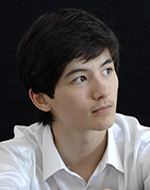The first-ever Cliburn International Junior Piano Competition drew to a close Sunday afternoon at TCU’s Ed Landreth Auditorium after a week in which twenty-four competitively selected young pianists aged 13-17, hailing from around the world, competed in preliminary, quarter-final, and semi-final rounds. By Sunday afternoon, the field was narrowed to three finalists from China, Kazakhstan, and Russia, each of whom performed a complete concerto with the Fort Worth Symphony and conductor Mei-Ann Chen. And Sunday’s performance yielded one young musician who is just about as close to a sure thing for superstardom as a teenager can be—but who, however, came in second in the final list of awards determined by the seven-member jury chaired by 1997 Cliburn gold medalist Jon Nakamatsu.
That sixteen-year-old St. Petersburg native Arsenii Mun left with the second-prize trophy (and a total of $7,000 in cash and scholarship awards) will hopefully prove no discouragement to a musician whose polished and passionate rendition of Grieg’s Concerto in A minor revealed an artist already in possession of remarkable technique and insight. Grieg poured equal portions of seductive lyricism, virtuosic thunder, and folk-music energy into this concerto, a long-standing audience favorite, and the formula proved an ideal canvas on which to display Mun’s surprisingly mature outlook. Mun’s technique is impressive, and, from where I sat, nigh-well flawless; more important, he communicated a sincere and unique sense of the poetry in the music.

Poetry was the one thing missing in the performance of Tchaikovsky’s Piano Concerto No. 1 by the first-prize winner, Tashkent-born Alim Beisembeyev, who currently studies in London. Like Mun, Beisembeyev owns perfect technical prowess, and, for that matter, a slightly greater ability to push sheer volume out of the piano. While every note was in place and every tempo and dynamic marking obeyed, this listener missed the sense of personal involvement and emotional risk that are the hallmarks of a great performance. At seventeen (and, as of Sunday afternoon, richer by $12,000 in cash and scholarship funds) Beisembeyev has time to develop this sort of presence in his music-making. And, for that matter, the element of technical perfection in so young an artist is much more striking than, at his age, the absence of a mature intellect.

Chinese-born Youlin Ji, 16, who currently studies with Yoheved Kaplinsky in the pre-college division at the Juilliard School, took third prize (and cash and scholarships totaling $4500) after her performance of Chopin’s Piano Concerto No. 2. Ji earned the prize and the honor with strikingly elegant and brilliant delivery of the sparkling passage-work, particularly abundant in the slow movement. Like Beisemeyev and Mun, Li is a pianist with a high probability of a brilliant career ahead.
Patriotic music-lovers who might bemoan the absence of Americans from the final round can take comfort in the awarding of the special prize for Best Performance of a Classical Sonata to Californian Misha Galant, 17, who also received the audience-voted Audience Award, and by the presentation of a Jury Discretionary Award to New Yorker Clayton Stephenson, 16. Canadian Tony Yike Yang, 16, also received a Jury Discretionary Award, while Hungarian Adam Balogh, 16, was honored with the Award for Best Performance of a Lyrical Work.
Throughout Sunday afternoon’s performance, the Fort Worth Symphony and guest conductor Chen collaborated magnificently. Chen has a magic touch for creating an assertive, engaging reading (for instance, in her fresh phrasing of the famous opening passage of Tchaikovsy’s Concerto No. 1) while allowing the young musicians ample support and flexibility. And the Fort Worth Symphony, the most experienced competition orchestra in the world, once again proved itself one of the best in that particular field.
The teenage years are tricky in the development of an artist; there’s a fine line between enough exposure and too much, at a time in life when young musicians need space to grow emotionally as well as musically. In its first manifestation, the Cliburn International Junior Piano Competition appears appropriately grounded, admirably combining professional-level pressure with the same performer-friendly atmosphere that has been a large part of what has made the main Cliburn Competition (which will come around again in 2017) the pinnacle of the competition world. On the basis of the performances I heard this weekend, the Cliburn Junior is already, like the main Cliburn Competition and the associated Cliburn Amateur Competition, the best of its kind.





